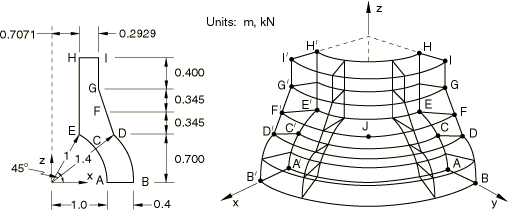LE11: Solid cylinder/taper/sphere—temperature loading | ||
| ||
ProductsAbaqus/Standard
Elements tested
C3D20
C3D20R
![]()
Problem description

Mesh:
A coarse and a fine mesh are tested.
Material:
Linear elastic, Young's modulus = 210 GPa, Poisson's ratio = 0.3, coefficient of thermal expansion = 2.3E−4/°C.
Boundary conditions:
0 on the plane 0. 0 on the plane 0. 0 on the plane 0 and the face HIH′I′.
Loading:
Linear temperature gradient in the radial and axial directions is given by
This is applied using user subroutine UTEMP.
![]()
Reference solution
This is a test recommended by the National Agency for Finite Element Methods and Standards (U.K.): Test LE11 from NAFEMS Publication TNSB, Rev. 3, “The Standard NAFEMS Benchmarks,” October 1990.
Target solution: Direct stress, = −105 MPa at point A.
![]()
Results and discussion
The results are shown in the following table. The values enclosed in parentheses are percentage differences with respect to the reference solution.
| Element | , Coarse Mesh | , Fine Mesh |
|---|---|---|
| C3D20 | −96.71 MPa (−7.9%) | −103.26 MPa (−1.7%) |
| C3D20R | −93.04 MPa (−11.4%) | −99.60 MPa (−5.1%) |
![]()
Input files
- nle11fkc.inp
-
C3D20 elements.
- nle11fkc.f
-
User subroutine used in nle11fkc.inp.
- nle11rkc.inp
-
C3D20R elements.
- nle11rkc.f
-
User subroutine used in nle11rkc.inp.
- nle11fkf.inp
-
C3D20 elements.
- nle11fkf.f
-
User subroutine used in nle11fkf.inp.
- nle11rkf.inp
-
C3D20R elements.
- nle11rkf.f
-
User subroutine used in nle11rkf.inp.